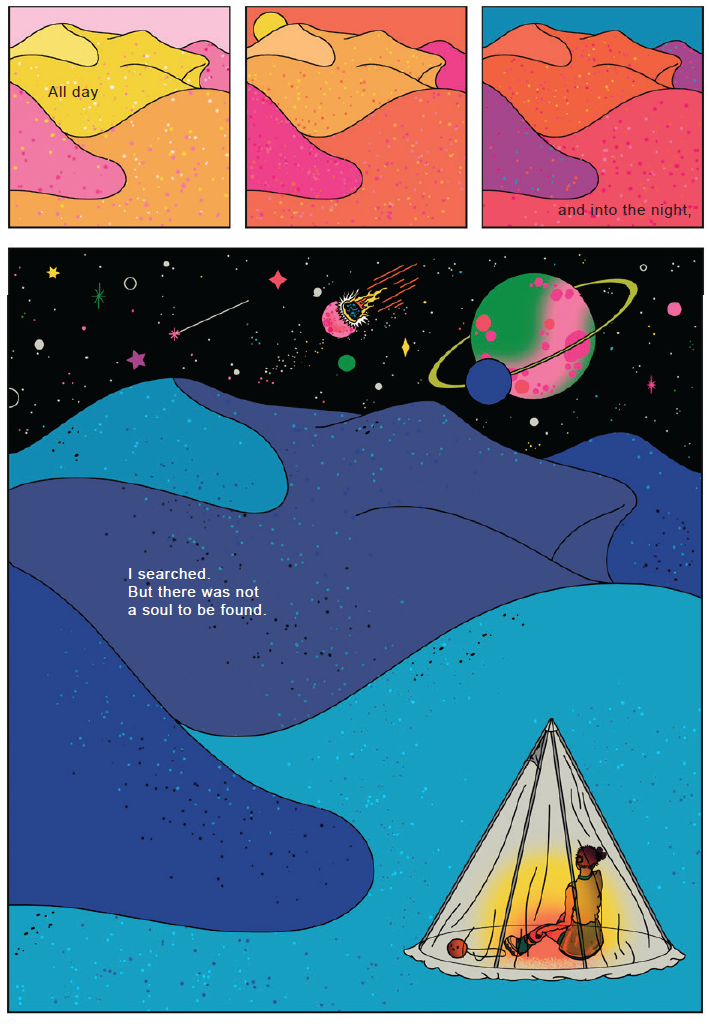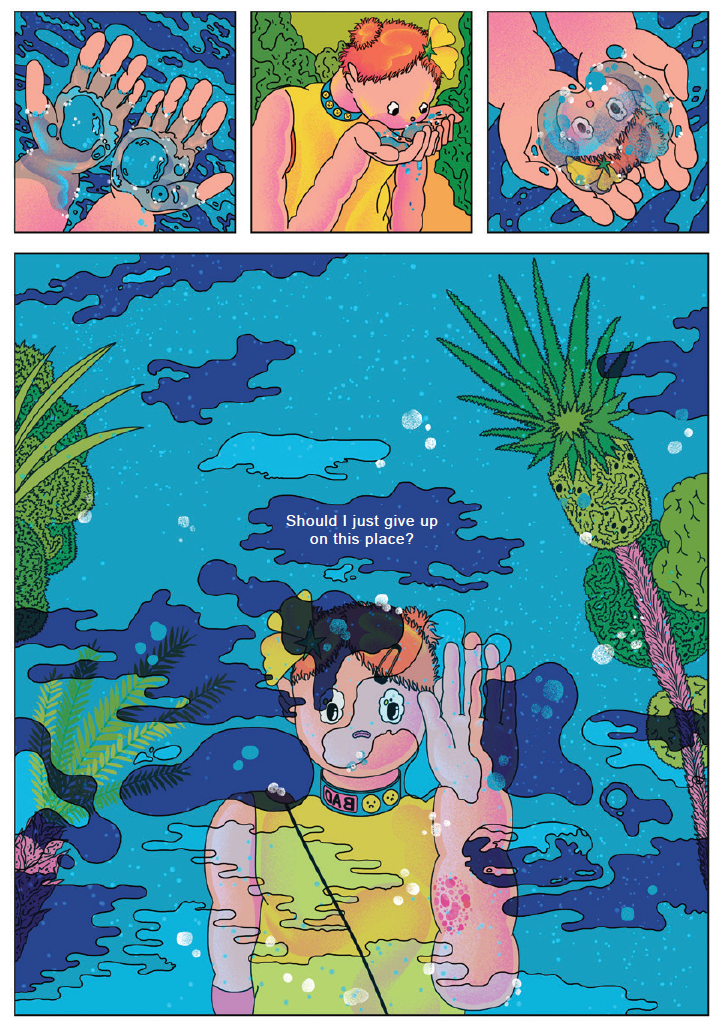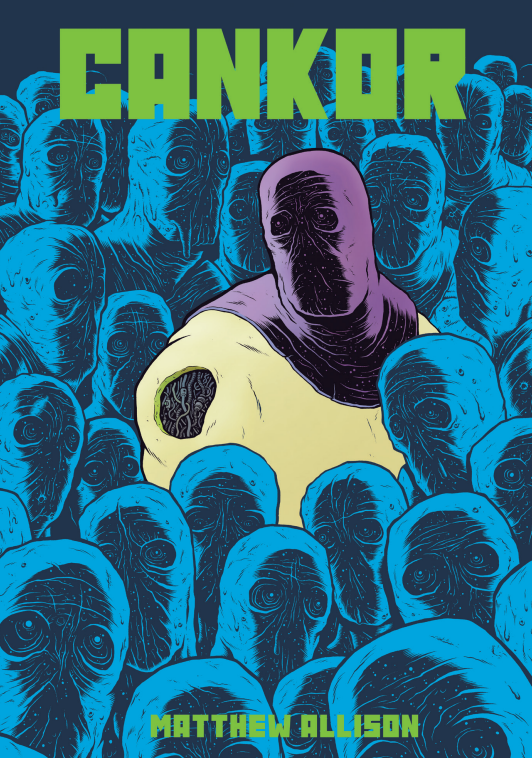If there is one thing which any comics critic worth their salt dreads, it’s a didactic comic. We are supposed to champion works that celebrate aesthetic anarchy, troubling personal visions, literary grit, formal splendor. Of course, we make an exception for marginalized expressions, inspired propaganda - the great and/or terrible messages told greatly through the graphic arts. We (meaning, as should be clear by now, I) tend to thumb our noses at fluff like the inspirational cute comics which currently clog the canals of Instagram recommendations - the kind of filler where a low effort pink blob copied from some other artist’s low effort pink blob tells you to remember to drink water. Maybe the pink blob will have an important message, like how it’s okay to be a fan of gay rights, but it’s still what it is. Junk. Not something that’s going to change the world in any sort of way. Disposable comfort. We rightly don’t want comics to be that.
So what am I to make of a brief, didactic, polished message comic illustrated with dazzlingly formalist artistry?
Platonic Love is a loosely science fiction-themed parable of gay rights, created by its artist, A ee mi, over the course of 2018, as Taiwanese voters passed a referendum to ban same-sex marriage in the country. It chronicles a world where sex differences and gender roles are designated by colored marks–green for boys and pink for girls–and one girl-type being’s journey across space and time to find a tolerant planet where she can achieve a homosexual union. In the comic’s most heartfelt moments, A ee mi explores the isolation and despair of living queerly in an enforced straight society - landing on a planet of sauropods, our heroine is dismayed to find its inhabitants to all be straight, and watches in horror as the only other gay woman in the world is devoured by a massive male carnosaur. Journeying across psychedelic cosmic terrain brought to life in vivid neons, our traveler remains seemingly alone amidst the endless reach of heterosexual regulations, pairing off discrete categories of female and male in compulsory union. The comic twists the bureaucratic tragedy of enforced homophobia into a psychedelic adventure through far-out terrain, with a razor-precise yet ever so slightly wiggly clear line rendering gelatinous forms that always seem on the verge of melting off the page.
A ee mi’s artistry is stunning and effective, and yet the work feels slight. Her narrative is incredibly didactic, spelling out every theme in text on every page, just so it can’t be missed, while avoiding any visual depiction direct enough to provide the impact of effective protest art. The aesthetics on display are very much those of a commercial illustrator, borrowing tricks from the more forward-thinking Riso artists of the 2010s in the service of imagery that is cute and immediately digestible. Oftentimes, the work feels tuned towards sharing on social media, with its immediately pleasing color schemes and overwhelmingly simplified messaging. The reader will get everything they need to know at a digestible glance, and likely not feel much need to revisit or even think about these images in the future. This is disposable, derivative entertainment - even with the Very Important Message it carries, one wonders if that relevance predominantly serves to get a reader in agreement with that message to happily engage without worrying too much. It is a comic with the weight and depth of a tweet.
Platonic Love’s message of queer pride is delivered so simplistically that it at times undercuts itself. From its opening exposition, A ee mi leans on essentialist, color-coded imagery for gender and sexuality. Men are always green, women are always pink, non-binary genders are just barely acknowledged with the aid of some elegant color washes. This easily understood visual grammar works against the opposition to the heteronormative panopticon that A ee mi intends to express. There is very little space to acknowledge bi/pan sexual expressions, or the many forms of gender transgression that are a part of any queer experience. Because of the lesbian standpoint of the protagonist (and, presumably, the artist), the binary color scheme ends up providing a message closer to green = boy = evil/violent, and pink = girl = good, a logic not altogether unlike the gender binaries which enforce homophobia and transphobia on institutional levels worldwide. Complexities are flattened—dare I say, pushed into the closet—in the service of inoffensive messaging that will resonate quickly with the majority.
And yet, despite my sharper criticisms, I cannot dismiss Platonic Love as a trifle. The perspective that I bring to this work is that of a white queer woman in Canada, for whom the urgency of a nationwide vote to strip Taiwanese queers of equal rights in society is not even a distant memory. At this moment, as I and my trans comrades witness alarming and rapid attacks on trans rights storming the United States, the urgency of A ee mi’s parable becomes readily apparent. This is a comic that, with as much honesty, directness and humor that the artist can muster, expresses a moment in time like so many other horrible moments in many times and places where the horizon on queer existence and queer joy seemed to be collapsing, when our ability to simply exist and breathe and find each other was attacked and stifled at every turn. These are dreadful times, when hope can be difficult to find - a living death that the majority does not care about. Gays will always fight for our rights, total gay liberation is possible. But in times of oppression, our survival is the love, empathy and comradery we can offer each other. Platonic Love speaks to all of those feelings: the despair; the hopeless grind of wading through a cishet world searching for somewhere it can be safe to be yourself; the relief that comes with finding someone, somewhere who understands and loves you. I can only imagine the solace and catharsis these pages carried for Taiwanese readers in 2018, painful realities reflected in the cosmic glow of cartoon delights. If all that Platonic Love has to offer is sweetness, that sweetness should still be cherished and loved, and remains a document of a time and place when that comfort was profoundly needed.












